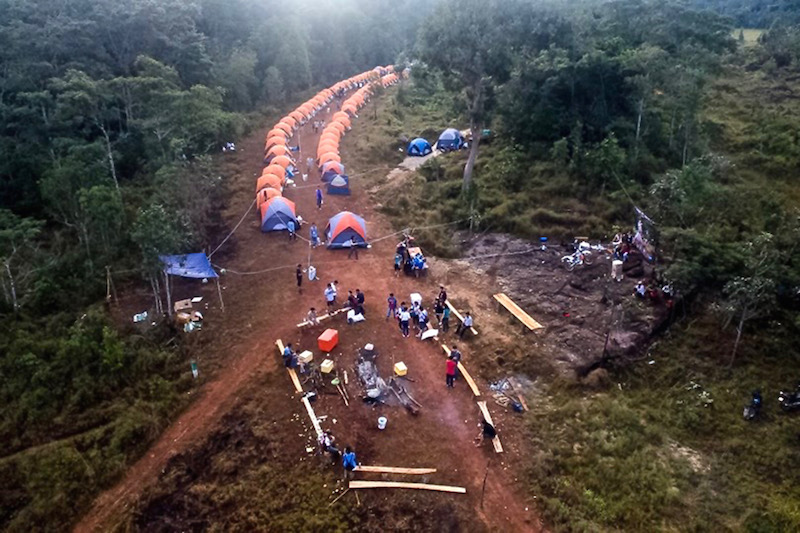Getting off the beaten path has long been the aim of travelers looking to avoid crowds, become one with nature or just experience something new. Seang Makara first got into adventure travel more than a decade ago as a competitor in mountain bike races hosted by a local bicycle shop.
“These trekking activities have been going on as far back as 2003,” he said, adding that he and a group of friends have since traveled the country to find and forge new paths.

But with more Cambodians looking to step away from the buzz of typical vacation spots such as Siem Reap and Sihanoukville, Mr. Makara is now looking to turn a profit off the trend.
“It just lacks the organizational structure to keep up standards to make it a business,” he said of adventure tourism. Seeing an opportunity, he founded Cambodia Camping about three months ago, offering cycling, trekking and camping travel packages.
Mr. Makara had expected about 50 people to join his first event, a camping outing in Koh Kong province last month, but ended up with 160 people—mostly young Cambodians—coming along for the adventure. He said he hoped to host an event next year with more than 500 people.
Kosal Puthy Ratanak, a 25-year-old freelance videographer, counts himself among the young city dwellers looking to escape the noise of Phnom Penh whenever he gets the chance.
“I want to discover more about my country before I do the same thing abroad, and make myself feel comfortable and relaxed,” he said.
Along with a crew of friends, he recently biked across provinces and trekked the width of Koh Rong Sanloem island off the coast of Sihanoukville. “I can learn at least one thing from each place I go,” he said.
And while those like Mr. Puthy Ratanak are looking to get out of the bustling city, they have to gear up first, leading local retailers to increase their stock of outdoors apparel and equipment.
Tob Sarith, assistant manager of sports and stationery at Aeon Mall, said an initial sale rack of tents on the walkway had turned into a permanent outdoor equipment section on the mall’s first floor.
“We just tried to sell some products at the main entrance and later it received great popularity,” he said, adding that Cambodian families planning trips to natural environs— along with foreign tourists—were making most of the purchases.
He said the mall could sell 100 tents per month during peak camping seasons, when it’s not too wet or too hot, with prices ranging from $25 to $100 or more each.
The opportunity has not been lost on the government, which held a conference earlier this month on “sports tourism,” which includes outdoor travel as well as attracting foreign visitors with large-scale sporting events such as marathons or international tournaments.
“We want to have adventure sports for tourists as well, to do things such as trekking and camping, as we see the trends emerging,” said Kim Sereyroth, director of the Tourism Ministry’s department of tourism. “If we could develop those areas to be more tourist-friendly, it will attract more people to visit.”
The private sector is leading the way. Chan Leakheana, CEO of DomRei Angkor, a new event management company, has partnered with Tuborg beer for a New Year’s Eve sleepover under the stars. She said the company had already sold 70 percent of the 1,000 spots for a campout in Kirirom National Park.
“We want to create a different, fun experience that has never been done in Cambodia for the holiday countdown,” she said. “This year it will include camping, trekking, concerts and many other activities combined.”
Correction: A previous version of this article mistakenly stated that Ganzberg Beer was sponsoring DomRei Angkor’s New Year’s camping festival.



